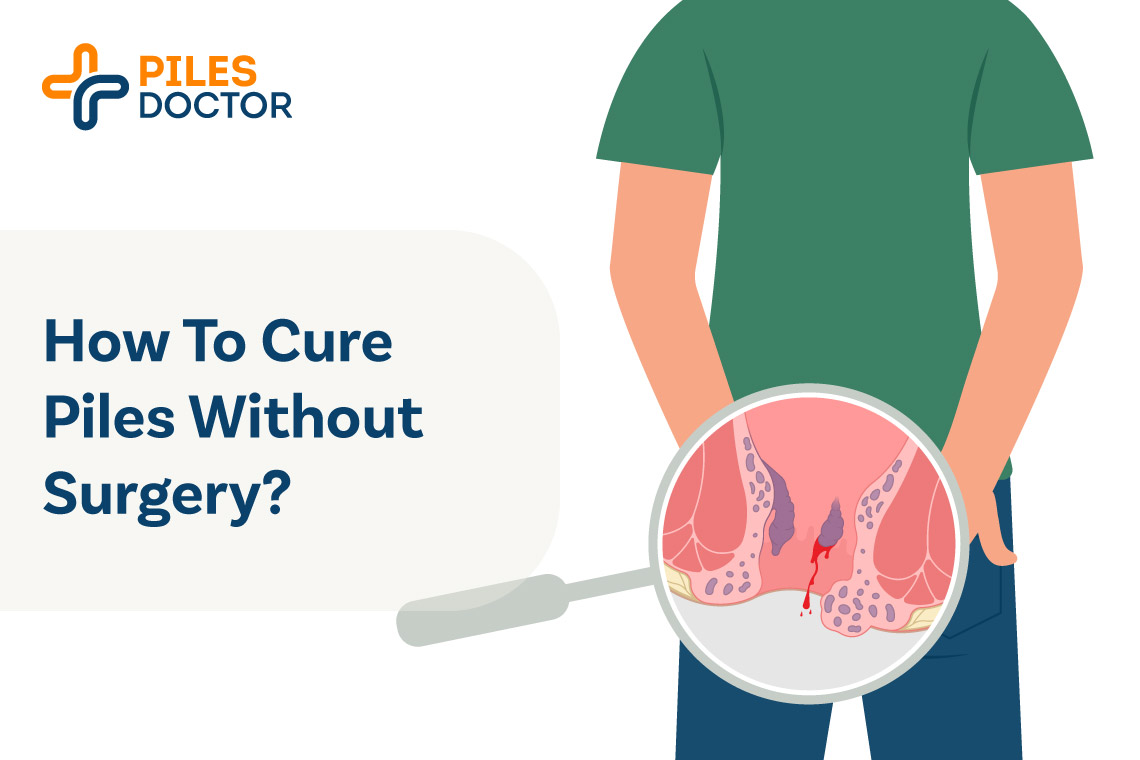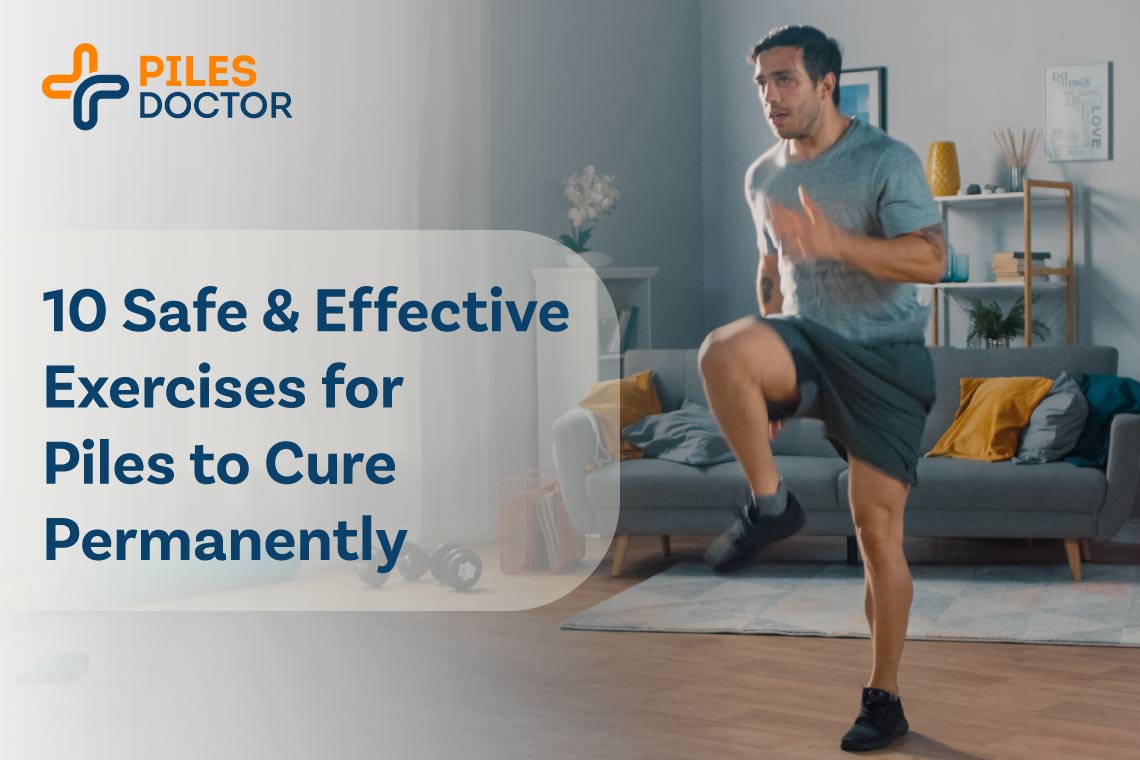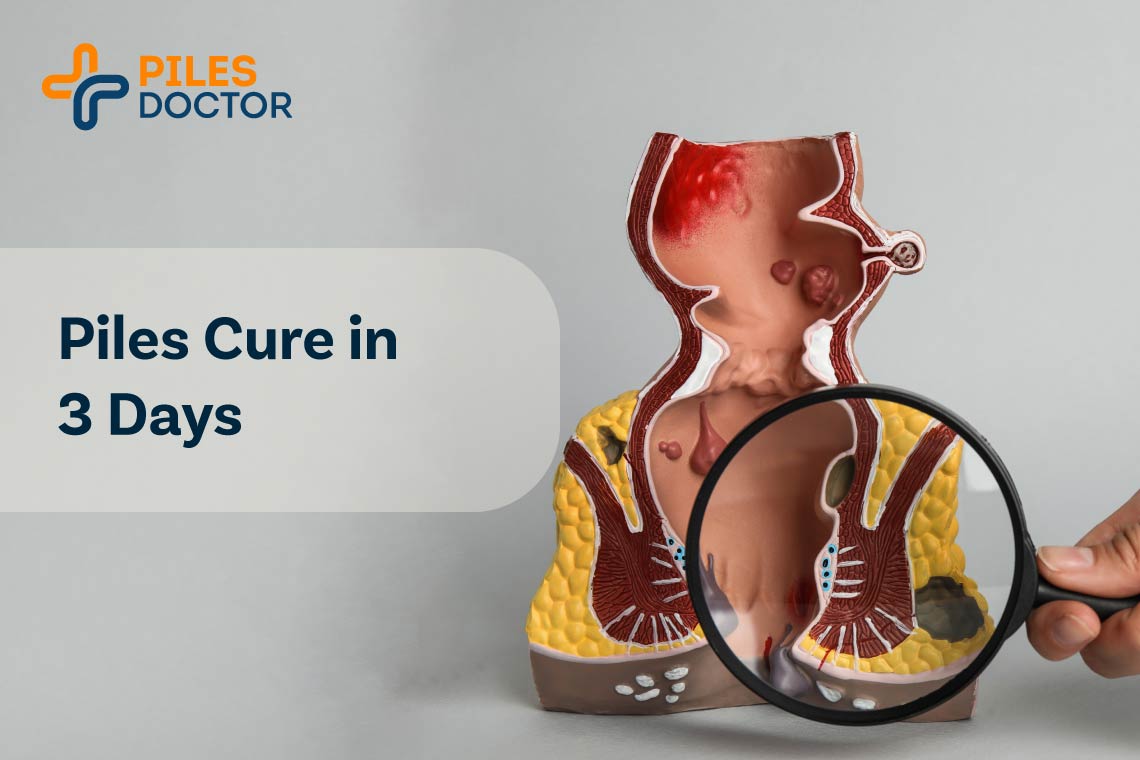Piles, often referred to as Hemorrhoids, is an anorectal condition that is characterized by swollen veins in the anus and lower rectum. Piles are generally not considered to be very serious. In most cases, they can be treated with non-surgical alternatives such as lifestyle changes, over-the-counter medications, and various home remedies.
In this blog, we will discuss non-surgical treatments for piles and what method of treatment may be best suited for you. Read on to learn more about piles and their various non-surgical treatments.
Non-Surgical Treatment For Piles
Some of the most commonly performed treatments for hemorrhoids without surgery are given below:
- Rubber Band Ligation: Rubber band ligation, often referred to as hemorrhoid banding, is a minimally invasive procedure that involves tying the base of the hemorrhoid with a rubber band. To remove a hemorrhoid using a rubber band, the proctologist inserts a small tool called a ligator into the anal canal and grasps the hemorrhoid with forceps. When the ligator cylinder is moved upwards, it releases rubber bands around the base of the hemorrhoid. These rubber bands cut off the blood supply to the hemorrhoids, and in time, they will wither and drop off. A rubber band ligation is typically performed as an outpatient procedure, meaning you will not be required to stay in the hospital.
- Sclerotherapy: Sclerotherapy treatment is primarily used to treat internal hemorrhoids. In a sclerotherapy procedure, the proctologist uses a chemical solution known as sclerosant to treat hemorrhoids. This solution is injected directly into the piles using a thin needle and causes scarring and shrinkage of the hemorrhoid. Similar to rubber band ligation, sclerotherapy is generally performed on an outpatient basis and does not take more than 30 to 45 minutes.
- Infrared Photocoagulation: Commonly referred to as coagulation therapy, infrared photocoagulation is a medical procedure that is used to treat small and medium-sized hemorrhoids. This procedure is considered effective only for internal hemorrhoids. In this procedure, the doctor uses a small probe to deliver short bursts of infrared light to the hemorrhoid. This infrared light is used as a heat source to coagulate the vessels supplying blood to the hemorrhoids. As a result, the hemorrhoid slowly recedes, and a scar forms on the wall of the anal canal. In an infrared photocoagulation procedure, you do not need anesthesia or sedation of any kind. It is also an outpatient procedure and does not take more than 5-10 minutes to complete.
- Electrocoagulation: Sometimes referred to as electrotherapy, electrocoagulation is a procedure that uses an electric current to destroy the pile. The aim of this procedure is to use an electric current to thicken the blood vessels supplying the pile and cauterize the base itself. As a result, the pile begins to shrink and fall off on its own. In an electrocoagulation procedure, the proctologist uses a proctoscope to locate the hemorrhoid. A probe is then used to deliver an electric current to the hemorrhoid. The entire procedure is usually performed on an outpatient basis and does not take more than 10-15 minutes to complete.
Medications and Ointments
There are several medications and ointments that your proctologist may prescribe to effectively cure piles without operation. Some medications and ointments that are commonly prescribed as an effective treatment for hemorrhoids without surgery are given below:
- Over-the-counter Medications: OTC medicines, creams, ointments, and wipes can significantly help you relieve symptoms of piles. Some OTC medicines, such as Cortisporine and Pramosone, contain hydrocortisone which can be helpful in reducing piles symptoms such as swelling, itching, and burning. Additionally, medications such as ibuprofen may help relieve some of the pain associated with the condition. However, before using any of these medications, it is imperative to consult with your proctologist first and follow the recommended dosage.
- Nonsteroidal Anti-Inflammatory Drugs: Commonly referred to as NSAIDs, Non-Steroidal Anti-Inflammatory Drugs are medications that are commonly prescribed to reduce inflammation, pain, and fever. Examples of NSAIDs include ibuprofen and naproxen. However, these medications should be used under the guidance of a healthcare provider. Continue taking these medications until the total prescribed amount is finished. If you have any questions, make sure to clear them with your healthcare provider first.
- Vasoconstrictors: Vasoconstrictors or pressor medications are medicines that help relieve low blood pressure and other symptoms. These medications can help shrink the blood vessels and reduce swelling in the piles. They are available as topical preparations or in suppository form. Examples of vasoconstrictors include Phenylephrine, Dopamine, Dobutamine, Epinephrine, and Norepinephrine.
- Hydrocortisone Cream: Hydrocortisone is a corticosteroid and can be used to decrease swelling, itching, and pain caused by hemorrhoids. Hydrocortisone cream for piles is for rectal use only and should be applied in amounts prescribed by the doctor. It is also advised to avoid bandaging or dressing the area where the cream is applied. This could cause excess cream to pass through the skin and may lead to side effects. Some of the most commonly prescribed hydrocortisone creams include Anusol HC, Procto-Kit, Proctocort, and Proctosol-HC.
- Anovate: Anovate is a combination medicine that is used for the effective treatment of hemorrhoids without surgery. Anovate can help relieve various symptoms of piles, such as pain, swelling, itching, and discomfort. Anovate cream should be used as per your doctor’s prescription only. It is also to be noted that Anovate is for external use only. Avoid getting it into your eyes or mouth. In case of an accidental exposure, rinse thoroughly with water.
- Fibrinolytic Agents: Fibrinolytic therapy or thrombolytic therapy is the use of medications to break up blood clots that may have formed with external piles. These medications are typically administered through injection by a healthcare provider and can effectively cure piles without operation.
- Amoxicillin-Clavunalate: In some cases, piles can become infected and require medical attention. In such cases, Amoxicillin-clavulanate is one of the best antibiotic medicines for piles and is often used to treat infections caused by certain kinds of bacteria.
Home Remedies
There are various home remedies that your anorectal surgeon may recommend to help manage symptoms of piles. Some of the most commonly recommended home remedies for piles are given below:
- Consume High-Fiber Food: Eating a healthy diet that is rich in fiberous foods such as fruits, veggies, and whole grains can help you relieve symptoms of hemorrhoids. A fibrous diet can help increase stool weight, increase water retention, and decrease the pH level in the colon. Additionally, including fiber-high foods in your diet may help shrink hemorrhoids faster.
- Sitz Bath: A sitz bath is a warm water bath you sit in to relieve symptoms of piles, such as pain, burning, and itching in the perineal region. Soaking this area in warm water relaxes the anal sphincter and helps increase blood flow through the anal tissues. Additionally, it promotes healing and reduces the pain, itching, and irritation caused by hemorrhoids. In most cases, it is advised to perform a sitz bath at least 2-3 times a day for 10-20 minutes to reduce swelling and promote healing.
- Hydration: Drinking an adequate amount of water on a daily basis can be extremely beneficial in preventing constipation and maintaining regular bowel movements. Generally, it is advised to drink at least 2-3 liters of water every day. It is also important to avoid carbonated beverages. Instead, opt for healthy fluids such as fresh fruit juice and coconut water.
- Stool Softeners: Taking stool softeners can help ease symptoms of hemorrhoids by making your stool pass more easily and reducing straining. They can also help prevent piles by reducing chronic constipation. However, it is imperative to consult with your healthcare provider before using any stool softeners. Overdosing on such medications can lead to diarrhea and worsen your piles symptoms. If you are not sure what kind of stool softener to use, consult with your surgeon.
- Proper Hygiene: Maintaining good hygiene in the anal region to prevent further irritation. Clean the anus gently after bowel movement with a soft, moist toilet paper. Avoid rough wiping as it could worsen your symptoms. It is also advised to avoid using harsh soaps around the anal region.
- Exercise: Regular, low-impact exercises can help you manage symptoms of piles. Exercises such as brisk walking for 20 minutes daily can stimulate bowel function as well as enhance blood flow around the body. Alongside, yoga is considered to be a highly effective stretching exercise in relieving symptoms of piles.
When to See a Doctor About Hemorrhoids?
As previously mentioned, piles are not considered to be serious and are rarely dangerous. In fact, it is possible to cure piles without operation. But, if you’re struggling with any of the below-given symptoms, it is imperative that you contact your healthcare provider as soon as possible:
- You have rectal bleeding or notice bright red blood on the toilet paper
- You have pain and discomfort in your rectum or anus
- You have exhausted all non-surgical options, but the problem continues to persist and worsen.
- You have bowel movements that are maroon in color. This can be a sign of bleeding.
- You are experiencing excessive rectal bleeding that is accompanied by dizziness or faintness. In such a case, seek emergency medical attention immediately.
Conclusion
Piles or hemorrhoids is a fairly common anorectal condition that can occur due to a multitude of reasons. Piles is usually not considered to be serious. In fact, non-surgical alternatives such as medications, anorectal creams, and changes in lifestyle are considered to be effective treatments for hemorrhoids without surgery. However, this does not mean proper consultation with an experienced and qualified proctologist is not needed. Severe cases of piles that do not go away through a non-surgical approach usually require surgery. If left untreated, piles can lead to serious consequences.
If you are struggling with symptoms of piles, it is imperative that you seek medical attention as soon as possible. Contact us today and book your consultation with our highly qualified team of proctologists!



